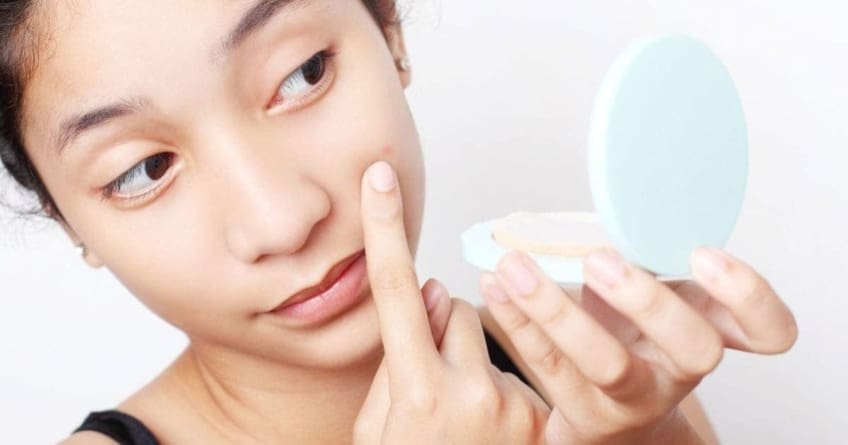
What is acne?
Acne is a common skin condition. It causes bumps on the skin known as pimples. Pimples form when the tiny hair follicles in your skin are blocked by dead skin and oil. This causes bacteria to grow and irritate the skin. Pimples commonly appear on the face. However, they can appear on the back, chest, arms, and neck. Acne usually starts in your early teen years. It can last into or begin in adulthood. Both boys and girls get it.
Symptoms
- Small, raised, red spots.
- White, fluid-filled tips on the spots.
- Blackheads (looks like pepper in your pores).
- Solid, tender lumps under the skin.
What causes acne?
Acne is caused by debris that block the hair follicles in your skin. The debris is made up of dead skin and oil. This blockage allows bacteria to grow in the hair follicles. There are several types of acne:
- Whitehead: The tiny hair follicles in your skin becomes blocked with oil and dead skin. A “whitehead” forms at the tip of each pimple.
- Blackhead: The hair follicle is blocked near the surface of the skin. It turns black when it is exposed to air.
- Cystic acne: This occurs when cysts form deep in the skin around the hair follicle.
Family history contributes to acne. If your parents had bad acne, you may have it too. Your immune system plays a role too. Some people are extra sensitive to the bacteria that get trapped in their hair follicles.
How is acne diagnosed?
Most of the time, your doctor can diagnose acne by examining the irritation on your skin. He or she will also consider your age, lifestyle, or circumstances. For example, some women get acne when they are pregnant. Some teens and adults get acne from certain foods.
Can acne be prevented or avoided?
Acne cannot be prevented or avoided. However, some people can reduce the severity by knowing what triggers the irritation. Because boys have more skin oils, they tend to have more severe acne. They have more skin oils. For many people, acne disappears by the age of 25. However, it can continue well into adulthood.
Certain things can trigger or make acne worse:
- Hormonal changes. This happens during puberty, before a woman’s period (menstrual cycle), during pregnancy, or during menopause.
- Certain medicines. This includes supplements or steroids that increase testosterone.
- Makeup (cosmetics), especially oil-based products, suntan lotion, and hair products.
- Stress.
- Picking or squeezing existing pimples.
- Scrubbing your skin too harshly.
- Certain foods, including sugary drinks, white breads and rice, have been shown to increase acne.
Acne treatment
Acne can be treated with over-the-counter (OTC) and prescription medicines. Your doctor will determine which is best for you.
OTC treatments include:
- Benzoyl peroxide and salicylic acid. This is the most common treatment. It comes in the form of a lotion, gel, soap, or cleansing pad. It kills the bacteria and dries up the oil. It may take up to 8 weeks to see any improvement. Side effects include additional skin irritation, burning, and redness.
Prescription medicines include:
- Retinoid creams or gels. These are applied to the pimples. Pregnant women should not use certain retinoid products. They can cause birth defects. Tell your doctor if you are pregnant. Sun exposure can irritate acne treated with retinoid cream.
- Antibiotics. Certain types of antibiotics can be used with other acne treatments.
- Isotretinoin. This is a strong medicine available under certain brand names. It can cause serious side effects. Talk to your doctor about the side effects.
- Birth control pills. These are sometimes effective for women diagnosed with acne.
Additional treatments are available in your doctor’s office. These include skin peels, skin ablation, and laser or light treatments. These treatments may reduce scarring caused by acne. Small injections of steroid medicines can help treat large acne cysts. Finally, certain lifestyle changes may help. This includes a healthy diet and regular exercise.
Living with acne
Having acne can cause embarrassment and anxiety. Some people may feel overwhelmed by the extra time and effort it adds to your daily hygiene routine. And it may require changes to your diet and lifestyle.
Questions to ask your doctor
- Should I clean my face more often?
- Does dairy cause acne?
- Will chlorine irritate my acne?
- Can I cover my acne breakout with makeup?
- Will my acne scar my face?
![]()
Copyright © American Academy of Family Physicians
This information provides a general overview and may not apply to everyone. Talk to your family doctor to find out if this information applies to you and to get more information on this subject.






